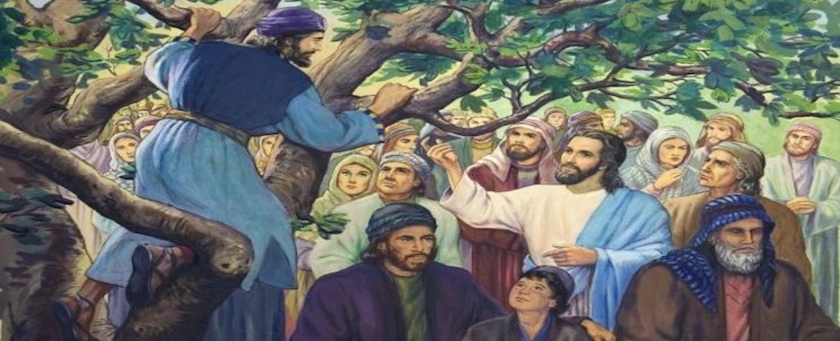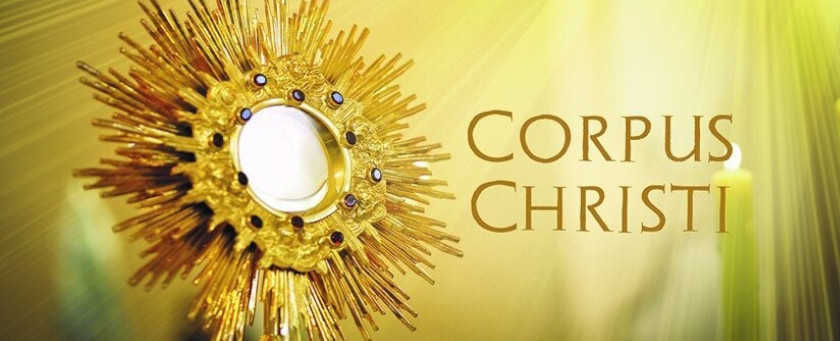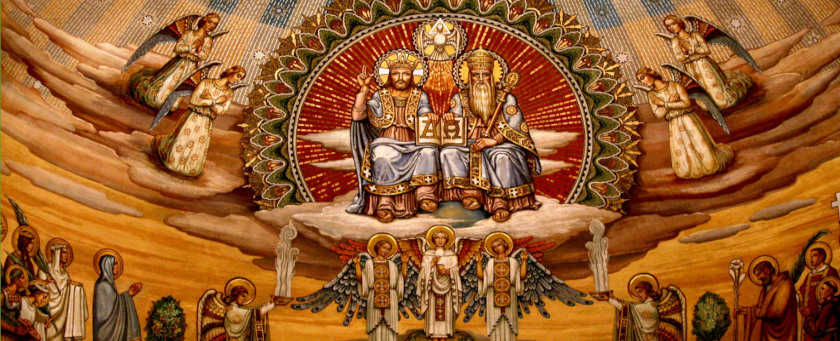Jesus is the Face of God's Mercy and Love
Thirty-first Sunday in Ordinary Time, Year C

Readings:
Wis. 11:22-12:2; Ps. 145; 2 Thes. 1:11-2:2; Lk. 19:1-10
(Audio recorded live, 30 October 2022)
The worldview of Almighty God as presented to us in the Book of Wisdom focuses us on God as Creator and lover of people. We get the sense that the author of the book is musing on how far God is above us, and yet has mercy on all, overlooking people’s sins that they may repent. At the heart of God’s love, then, is mercy. None of us could ever claim to know the mind of God, nor could we claim we have created anything other than what God has enabled us to create, whether that be fine art, music, or some other craft. For some, God has enabled them to procreate and have children. This would seem the ultimate act of participation in God’s creation, for it requires the complementarity of man and woman, and from their love new life is born. For you love all things that are and loathe nothing that you have made. And as it says in the Book of Genesis, “God looked at everything he had made, and found it very good” (Gn. 1:31a). And so, we see this image of God as one of Creator and lover of creation, but with a special interest in mankind, who was made in his own image and likeness.
St. Paul prays that the Thessalonians may be made worthy of their Christian calling, so they may powerfully bring to fulfillment every good purpose and every effort of faith. The Thessalonians were the first community founded by Paul and they experienced painful persecution for their faith. That is why Paul prays for them, that they may endure their hardships, and he warns them to be weary of false prophets and preachers who talk about the end times. This passage offers solid advice for us as well. Coming out of a global pandemic, with war in the Ukraine, inflation on the rise, threats of food and gas shortages, it makes us wonder: Is this the end? And there are dozens and dozens of these so-called prophets on the internet saying the end is nigh. Well, this is not the first time we have experienced this level of instability, and it will not be the last. What we are called to do, however, is remain in a state of grace, firmly rooted in our faith in Jesus Christ. It is he that saves, not presidents; it is he who redeems, not banks; it is he who sanctifies, not money or power. Take all that away and what are we left with? Faith, hope, and love, but the greatest of these is love.
That brings us back to God’s mercy, which is rooted in love. In our Gospel, Jesus is passing through Jericho, a city on the way to Jerusalem. It so happened this city was home to a tax collector, Zacchaeus, who wanted to see Jesus. Of the whole crowd, Jesus chooses to single out Zacchaeus. Perhaps Jesus saw that Zacchaeus had faith; Jesus certainly knew in his Sacred Heart that Zacchaeus was in need of mercy. The extra effort Zacchaeus makes by climbing the Sycamore tree made him stand out of the crowd. Jesus then tells him that he will be having dinner at his house. Rather than merely cut through Jericho, Jesus decides to spend the night with a sinner. This is the kind of love and mercy that can only come from God. Zacchaeus knows in his heart that he needs to make some changes in his life, so he tells Jesus that he will repay anyone he has extorted, and give away half of his possessions to the poor. He does exactly what Jesus asks the rich young man to do in Matthew’s Gospel. Remember? He tells the rich young man to go sell what he has and give to the poor, then come and follow him. Seems to me Zacchaeus understood the value of letting go of riches to inherit the kingdom of God.
Most importantly, near the end of the Gospel, Jesus says, “Today salvation has come to this house because this man too is a descendant of Abraham.” Those Jews who became tax collectors were considered to be traitors and sinners to all the rest. They were ostracized and looked down upon. It is no wonder, when the practice of extortion and skimming off the top was regular practice among tax collectors. But, Zacchaeus has a change of heart, and for this, Jesus restores him to his people, who are all descendants of Abraham. That is the power and love of Almighty God at work in reconciling us to himself and one another.
What about us? Are we aware of some sin that has kept us from embracing the fullness of God’s love? Do we find ourselves searching for someone to make it all right? We need look no further than the Sacred Heart of Jesus. He is our love; he is our savior; he is the very mercy of God poured out for each of us. And so, as we turn to the celebration of the Eucharist, may the communion we share, the most Precious Body and Blood of Jesus, our Lord, help us to embrace him in love. And may the mercy of God restore us in mind, body, and spirit, as we seek to be reconciled with God and one another.





Twitter
Facebook
Pinterest
Email